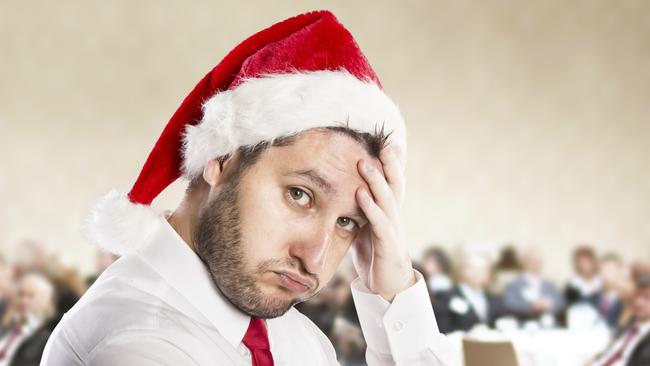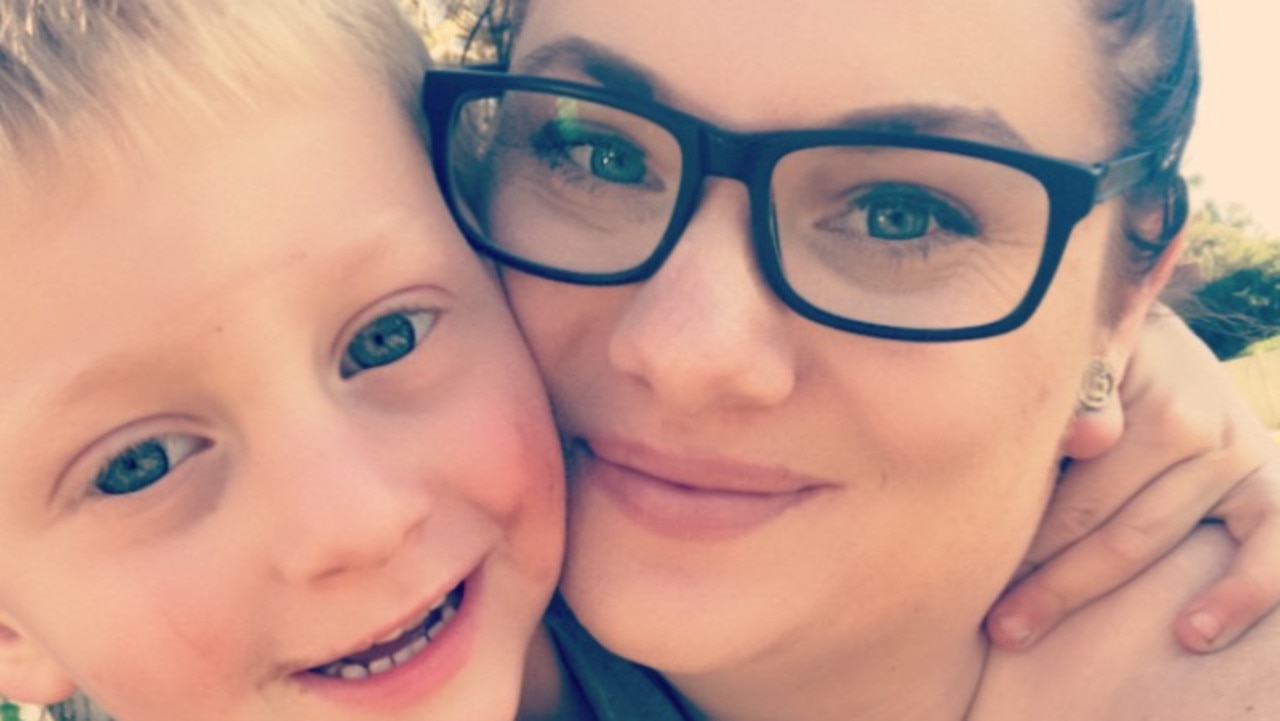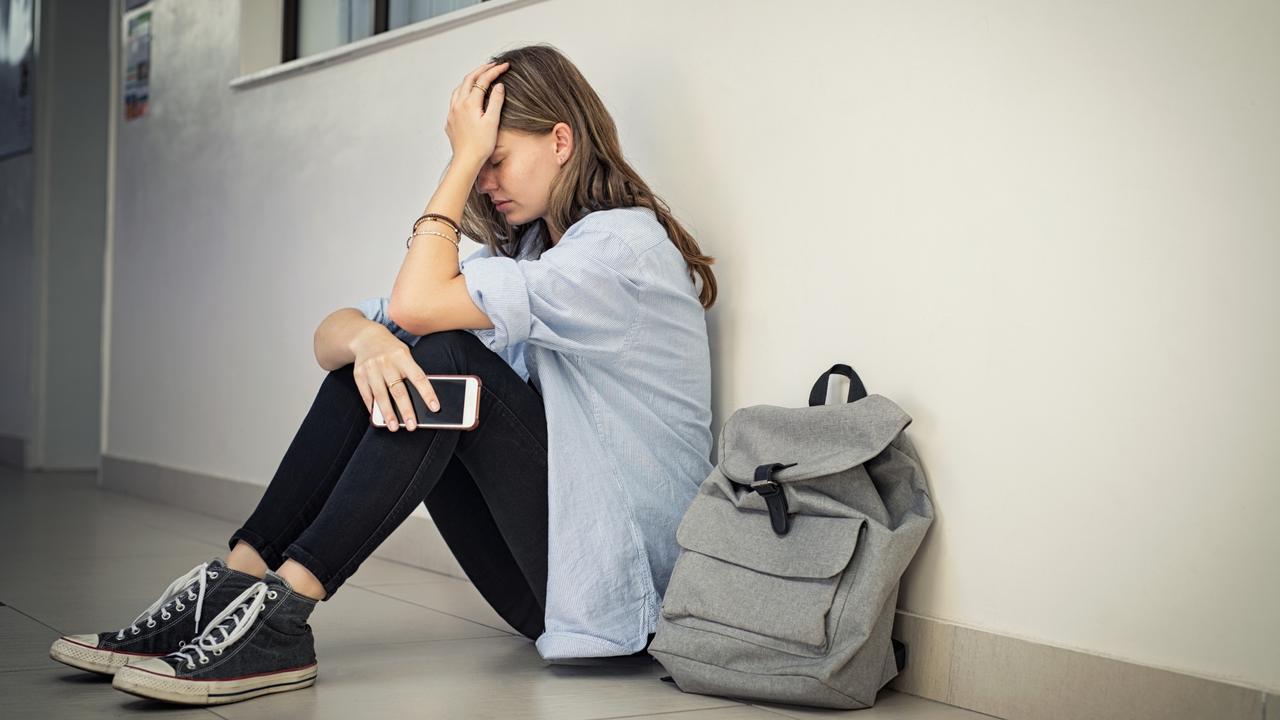Experts reveal top tips on how to survive Christmas if you dread the holidays
If your stress levels have been rising over the festive period you’re definitely not alone. These are some top tips from experts on how to reduce your anxiety over Christmas.

Mental Health
Don't miss out on the headlines from Mental Health. Followed categories will be added to My News.
It’s the most wonderful time of year – or at least that’s what we’re told.
But for those navigating financial pressure, complicated family dynamics, grief or loneliness a month strongly tied to socialising, family and spending money can feel like more of a chore than a celebration.
And to make things harder, reminders of how much fun everybody else is supposedly having – from our social media feed to the carols in the supermarket – are everywhere.
Beyond Blue clinical spokesman and psychologist Dr Luke Martin said it was not unusual to find the holidays challenging and feel “quite overwhelmed, quite anxious or quite isolated”.
“We do hear from a lot of people that this is one of the toughest times of the year for their mental health,” he said.
He said this was exacerbated by the idea of creating the “perfect” or “magic” Christmas for ourselves and the people around us.
“That builds up all these expectations that put a lot of pressure on people,” he said.
Beyond Blue sees demand increase in January and February when people – after bottling up their feelings for several weeks- reach out for help.
Dr Martin said people were often in “quite high levels of distress” by this stage, but there were ways to cope – and that included reaching out for help earlier.
“We’re really keen for people to reach out sooner than that, so they don’t struggle through this festive season,” he said.
“It’s never too late, but it’s also never too early to get in touch with us.”
Here are some tips from experts on managing anxiety ahead of the festive period.
Take breaks when dealing with toxic relatives
Monash University psychiatry Professor Jayashri Kulkarni, who is also the director of HER Centre Australia, stressed the importance of having a support person at family gatherings.
“There can be old and new scars and unresolved conflicts with family members,” Prof Kulkarni said.
“It’s always important to have a support person and that you word them up, so if issues do arise there’s potential for them to steer the conversation, be in a different room or step away from it.”
Prof Kulkarni said it was best avoid confrontations at events.
“Nothing good comes from having an all-out barney at a function because it will not be resolved and lead to further hurt.
“It’s not the time or the place to deal with those kind of issues.”

She also suggested avoiding a function completely if attending created too much anxiety.
“It’s not a terrible coping mechanism to avoid events because they know that the person they’re avoiding will create problems for them.”
Meanwhile, Bondi Junction psychologist Louisa Carlini from Psychmatters Concord, encouraged taking breaks at events to help with overwhelming feelings.
“Remove yourself from the situation – fresh air, reset and collect your thoughts,” she said.
Ms Carlini said having an “exit plan” was useful.
“Tell the host you may need to leave early to meet someone and if it is all too much leave early.”
Be kind
Beyond Blue’s Dr Martin said we should be “kind and gentle” to ourselves, and talk in the same way about ourselves as we would to a friend who was going through a difficult time.
“Watch your negative self-talk and talk to yourself in a kind and caring way,” he said.
He said we should also extend this kindness to others and do something (within reason) to help someone out.
“Often the fastest way to feel better is actually to go and help someone else,” he said.
Know the signs
Self-awareness at events is also good, according to Ms Carlini.
She said identifying the cause of your anxiety and managing your anxiety in helpful ways before the event was a “useful” strategy.
“It is helpful to detect the thoughts that cause you to stress,” she said.
“You will possibly be overcome with worries before a function and start catastrophising.
“These thoughts that pop in your head will make you more anxious and cause you to and apprehensive.
“It will be useful to use slow breathing to calm your body and clear your mind by focusing on your breathing and relaxing your muscles,” she said.
Dr Martin said, while feeling down or stressed sometimes was part of being human, it was important to recognise when negative feelings and thoughts persisted for too long.
“My rule of thumb is often, if you’re feeling this way for more than two weeks … you might want to have a chat with someone about it,” he said.
He said signs could include constantly feeling tense, irritable, flat and empty; lacking motivation; finding it difficult to sleep and withdrawing from social situations.
“When you get stuck in an unpleasant emotion or negative series of thoughts … it could be time to take some early action,” he said.
And – even if Christmas is always a happy time for you – it can be helpful to know these flags, in order to recognise them in other people.
He said these could include “sounding a bit negative about themselves or about their situation”, having “big reactions to small things” or skipping events — or attending them but acting not themselves.
“All these can be signs that it will be good to check in just ask ‘how are you going’,” he said.
Stay in a routine
Victorian psychologist Dr Janine Bounds said it was “crucial” for families to have routines throughout the festive season.
“This can really help parents, particularly those with young children, manage anxiety around the holiday period,” Dr Bounds said.
“The holidays can be a problematic period because we are out of daily routines. Small things such as having daily activities listed on a whiteboard can be useful.”
Dr Bounds said parents needed to ensure their children had reduced screen time during school holidays.
“Without a routine, children can be left glued to their iPads and this is unhealthy for them.
“It’s important for parents to make the most of outdoor activities with their children including going to the beach and finding other ways to stay active.”
Prof Kulkarni, agrees, saying people who are anxious need “structured lives” to be under their control.
“Suddenly things are not under their control because there is often a shutdown of workplaces as well and it’s different,” she said.

Be organised
Prof Kulkarni said “pre-planning” and “forward planning” were also essential to manage anxiety.
“If you are taking medications or you have a mental health practitioner, you need to pre-plan what’s going to happen with medications if the pharmacy you go to is shut down over Christmas,” Prof Kulkarni said.
“Similarly, forward plan for all of the Christmas activities that you can as it makes people extremely anxious to do things last minute such as Christmas and food shopping.
“Think about shopping at times where there will be fewer people around if you are socially anxious.”
The to-do list may feel a mile long, but Dr Martin said it was important to ensure we take breaks from the regular demands of life.
“Plan ahead to look after yourself,” he said.
“Just connect with those little things that bring you a moment of joy,” he said.
Say how you feel
It is also essential to keep communication lines open with family and friends, according to Prof Kulkarni.
“If you are feeling particularly stressed it is going to be a good debrief to be able to get it off your chest and talk to your nearest and dearest,” she said.
“It’s important to speak to those who understand your situation that you may not be able to attend a function as you’re feeling particularly down or anxious at that time.”
She added: “The other thing is that isolation can be a factor for people who are estranged or have difficult family relationships.
“Stress can erupt if there are un-worked through issues, conflict issues between family members and that can create stressors as well.”

Set boundaries
Dr Martin said one way to combat the pressure of the perfect Christmas was to set boundaries to ensure we didn’t just meet the needs of others, but our own too.
“We’ve become very focused on trying to keep other people happy,” he said.
He said it was “okay to say no to things”.
“It can take a bit of courage to actually put a boundary in and say ‘I’m not going to do that this year,’ or ‘I’m going to delegate, who’s bringing which dishes to the table to reduce the load on me.”
“Boundaries are better set early and communicated clearly and kindly to give people a chance, because they can’t read our mind.”
Ms Carlini also said setting boundaries was crucial to manage anxiety.
“Participating in conversations with someone you find comfortable will reduce your anxiety. It may be useful to stick with them,” she said.
“However, it is important that you don’t control them and read their cues of wanting to exit the conversation.”
Avoid hangxiety
Prof Kulkarni warned against using alcohol as a “medication”.
“Many times people self-medicate with alcohol and they say ‘once I’ve had a few drinks, then I’m fine’. That is not a good medication,” she said.
“It is not a good medication because it is actually physiologically addictive and has downsides because people get depressed after having used alcohol for anxiety purposes.”
This advice is echoed by Ms Carlini, who says not to drink excessively or using “hiding spots” to avoid others.
“While these ‘safety behaviours’ may assist you at that time, they may cause problems as you most likely will stand out and your insecurities may be noticed by others,” she said.
‘I was essentially couch bound’
Megan Barrow said she knows what it’s like to struggle at Christmas.
After battling with anxiety throughout her teenage years, she developed severe agoraphobia in her twenties.
“I was essentially couch bound,” she said.

“I couldn’t leave the couch, and I was absolutely terrified that I would die if I moved, so you can imagine Christmas was a really complicated time and a really terrifying time and a really isolating time.”
She said she already felt like she didn’t fit into the world – but during the holidays, when everyone’s social calendar appears to be jam-packed – these feelings were magnified.
She said after seeing a psychiatrist and finding the right medication and therapy – and a lot of hard work – she was now doing well, and it was possible to get better.
But, for those currently in the trenches, she has some advice on how to make it through.
Remember this will pass
My biggest message is that Christmas, whether it’s good or bad, it passes,” she said.
“Before we know it, it will be January and everyone will have forgotten what’s gone on.”
Ms Barrow said surviving this time was about “working out what’s right for you” – whether that’s scheduling a quieter day after a busy event that you know might be anxiety-inducing, or making a list of what will bring you joy.
“It’s okay to have a really quiet Boxing Day,” she said.
“Don’t worry if everyone else is putting pressure to catch up or whatever.
“Stock yourself up with a list of movies that you want to watch, or reading books or sitting outside, whatever it might be – try and plan ahead and do that.”
And if it’s somebody else you want to support at this time of year, she remembers what was – and wasn’t helpful – at the time.
“Sometimes it’s family or your loved ones who can be the most insensitive,” she said.
“Well meaning family members would say to me, when I was full on agoraphobic, ‘why don’t you just go for a walk’?
“To someone who can’t leave a house, [that] just makes you feel even more worthless.”
What did make a difference was simply showing up – like the cousins who stuck by her side when she had no choice but to go to her grandparent’s house for family Christmas.
“I’d literally be white knuckled in the car over to the other side of the city,” she said.
“Even though they didn’t really know what to do, a couple of my cousins were just beautiful.
“There’s a photo of me just sitting on a couch at my Nana and Poppa’s place, and my cousin just sitting around me.
“I don’t know that I really left the couch when I was there, but they sort of came to me and just supported me.”
She encouraged us to pay attention to others at this time of year, and said it was important to not assume people were okay.
“I know I didn’t ask for much, but just knowing someone had considered me made a big difference, because I really didn’t feel like I mattered and I could just slip away and no one would notice,” she said.
If you or someone you know needs help, contact Beyond Blue on 1300 22 4636.
Originally published as Experts reveal top tips on how to survive Christmas if you dread the holidays


